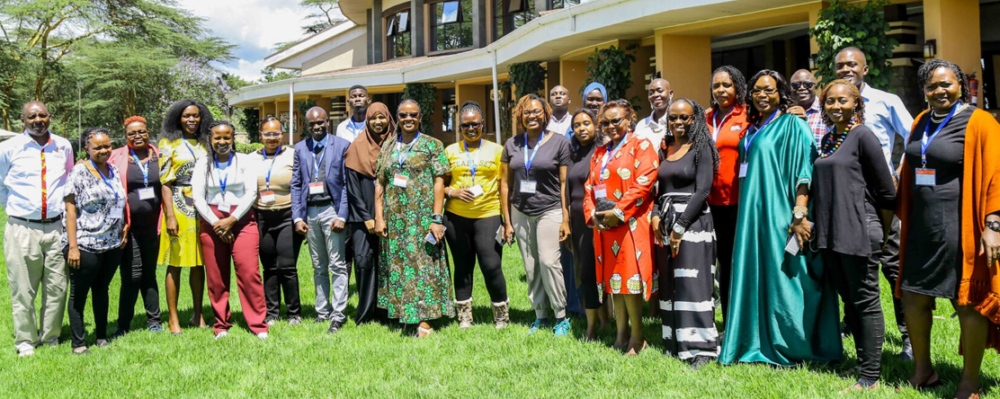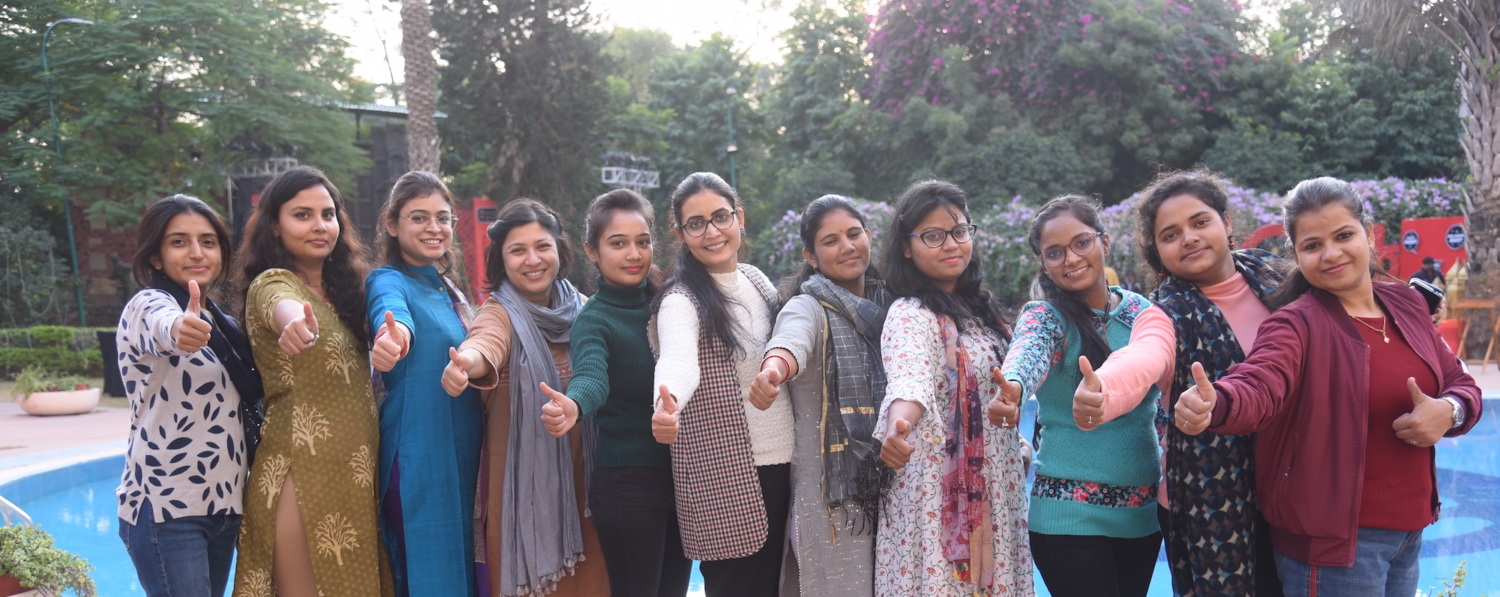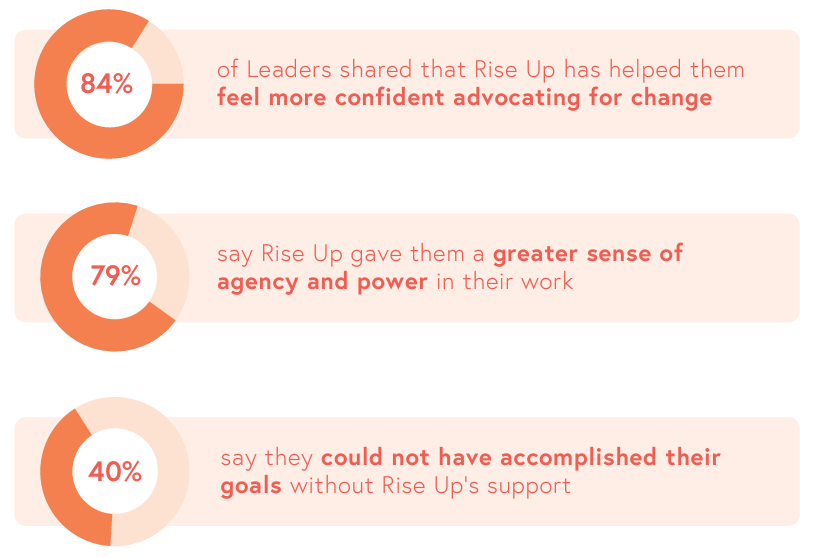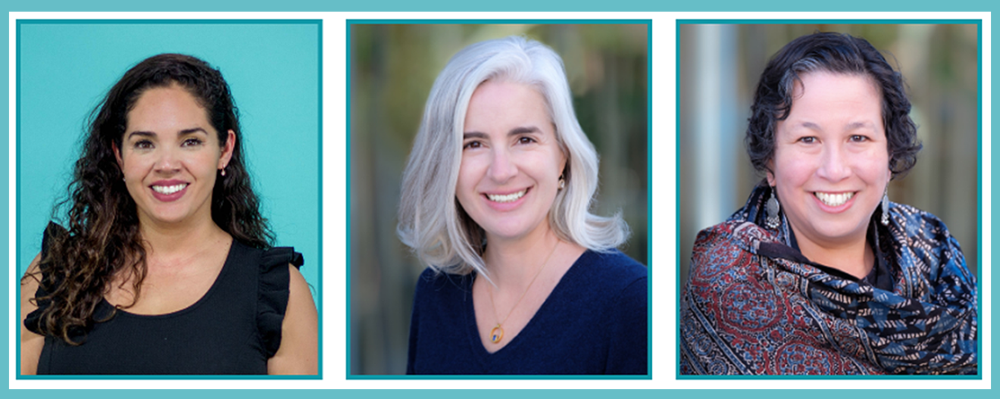
Listening to Community Leaders: New Data for Gender Equity Philanthropy (Rise Up External Evaluation 2017-2022)
-
Focus Areas
Capacity Building & Leadership, Global Health, Women, Youth & Children -
Expertise
Leadership Development -
Programs
Rise Up(PHI program 2009–2025)

PHI’s Rise Up partners with women, girls, and allies around the world who are transforming their communities and countries as part of a global movement for justice and equity. Rise Up builds power with local community leaders (“Leaders”)—innovative and determined advocates with deep experience supporting their communities and organizing for change to advance gender equity in health, education, and economic opportunity.
In 2023, PHI’s Rise Up partnered with Dalberg Advisors—a strategy consulting firm focused on strengthening inclusion and sustainability globally—to lead an external evaluation of Rise Up’s work between 2017-2022.
The evaluation focused on the question: “How can we most effectively support local community leaders to help them achieve their goals in gender equity policy and social norms change?” Across all findings, local Leaders call for funders—and all external parties—to shift their gaze towards community-based advocates. They ask to be treated as the strategists and experienced professionals they are, not as grantees whose capacity needs to be built.
see the evaluationKey Findings
Over the course of four months, the Dalberg team conducted focus groups, interviews, and surveys with members of Rise Up’s global network of more than 750 community leaders in 14 countries.
The research demonstrated that 75% of local leaders said their work is under-resourced, 30% face political instability and lack of political will, 25% struggle to combat entrenched harmful practices and beliefs, and 10% face threats of violence. Local leaders reported that they are not just looking for funding, but for integrated support—the training, accompaniment, network, and resources they need to achieve their goals.
Key findings include:
- Rise Up Leaders report that no single form of support is sufficient for their work. They urge philanthropic funders to provide a bundle of advocacy training, particularly in global best practices as applied in their specific country context, technical assistance and coaching to effectively launch their campaigns and navigate setbacks, and full cost funding, in the form of grants that allow them to do their work and also to take full advantage of the training and technical support.
- Leaders report wanting to work with fellow Leaders—collectively and cooperatively. They urge funders not to see individual issues or organizations in silos but to fund peer networks and strategic information sharing.
- Leaders report that providing small to mid-size, recurring grants (such as $10-20K per year) to local organizations can make a significant difference in their ability to drive policy and norms change for gender equity and justice. This is especially true if grants are predictable 3-5 year commitments that are delivered without abrupt pivots or exits in response to the emergence of new crises. Local Leaders urge funders to provide such grants, and highlighted that often even just $3-5K in additional funding could make a difference to their work.
- Leaders ask funders and other external supporters to support them in taking calculated risks (e.g., to test out community-driven advocacy ideas) in the service of increasing impact. Leaders report that such strategic risk-taking prepares them to make the difficult decisions inherent to gender equity advocacy work.
- Leaders advise funders to invest in rigorous monitoring, evaluation and learning (MEL) approaches that help both the funder and the Leader learn what works. For example, Leaders advised investing in MEL processes that are context appropriate (e.g., reporting systems that are verbal not just written), sophisticated (e.g., approaches that unpack the inherently non-linear, non-attributable nature of gender equity advocacy work), and bi-directional (e.g., finding ways for the Leader and their team to learn alongside the funder).
Effectiveness of Rise Up’s Model
Dalberg’s evaluation found that Rise Up’s model is highly effective in supporting leaders to drive impact. 90% of Leaders said that Rise Up helped them develop essential advocacy and leadership skills. Leaders rated the importance of Rise Up’s overall support in advancing their goals as 8.5 on a scale of 1-10, with 10 being “critically important.” Furthermore, nearly 40% of 220+ leaders surveyed indicated that they could not have advanced their goals without Rise Up’s assistance.
The staff are incredibly supportive… The local Rise Up staff have been extremely helpful in supporting and encouraging the work on the ground.Rise Up Leader, 2022
As a lawyer, I have seen law failing when it comes to reflecting the realities of communities… Often the law does not aim to heal the injustices of the past, but tends to perpetuate it further. It is important that we use a different approach.”Rise Up Leader, 2022
A few cannot change a system that is built on patriarchal roots and thrives on misogynistic power dynamics. If there needs to be a systems change, then it requires mobilization… As far-fetched as that dream may be, helping achieve 1% of it would be a step in the right direction.Rise Up Leader, 2022
The fact that they believed in me… I sent out so many proposals and started thinking I just don’t have the wherewithal, but Rise Up helped my confidence and so I stayed.Rise Up Leader, 2022

Originally published by Rise Up
Work With Us
You change the world. We do the rest. Explore fiscal sponsorship at PHI.
Support Us
Together, we can accelerate our response to public health’s most critical issues.
Find Employment
Begin your career at the Public Health Institute.

